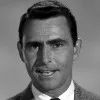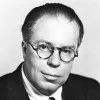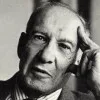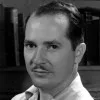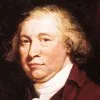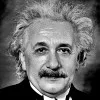However, it is my judgment in these things that when you see something that is technically sweet, you go ahead and do it and you argue about what to do about it only after you have had your technical success. That is the way it was with the atomic bomb.
J. Robert Oppenheimer (1904-1967) American theoretical physicist, "Father of the Atomic Bomb" [Julius Robert Oppenheimer]
“In the matter of J. Robert Oppenheimer,” testimony transcript, US Atomic Energy Commission, Personnel Security Board (1954-04-13)
(Source)
Quotations about:
ethics
Note not all quotations have been tagged, so Search may find additional quotes on this topic.
My ethical state,
Were I wealthy and great,
Is a subject you wish I’d reply on.
Now who can foresee
What his morals might be?
What would yours be if you were a lion?
[Saepe rogare soles, qualis sim, Prisce, futurus,
Si fiam locuples simque repente potens.
Quemquam posse putas mores narrare futuros?
Dic mihi, si fias tu leo, qualis eris?]Martial (AD c.39-c.103) Spanish Roman poet, satirist, epigrammatist [Marcus Valerius Martialis]
Epigrams [Epigrammata], Book 12, epigram 92 (12.92) (AD 101) [tr. Nixon (1911)]
(Source)
"To Priscus." (Source (Latin)). Alternate translations:Priscus! you've often ask'd me how I'd live,
Should Fate at once both wealth and honour give?
What soul his future conduct can foresee?
Tell me what sort of lion you would be?
[tr. Lewis (<1752)]What would I do, the question you repeat,
if on a sudden I were rich and great?
Who can himself with future conduct charge?
What would you do, a lion, and at large?
[tr. Hay (1755), ep. 93]You've often been used, my good friend, for to ask
What sort of man I might prove
Was I rich or soon great? but 'tis no easy talk,
For 'faith I can't tell you, by Jove!
For who do You think, of the men that are here
Can his manners divine, that You see?
And was you as Jonathan's bull or a bear,
Pray what sort of beast would you be?
[tr. Scott (1773)]Thou asketh oft, how I should brook the hour,
Of wealth o'erwhelming, and resistless pow'r.
His future self what seer can prophesy?
What lion, Priscus, should'st thou make? Reply.
[tr. Elphinston (1782), 2.143]Priscus! you often ask me what wouild be my future conduct, if I were made suddenly rich or powerful? Who can be competent to judge of his future character under such contingencies? Tell me, if you were metamorphosed into a lion, what kind of lion would you be?
[tr. Amos (1858), ep. 94]You often ask me, Priscus, what sort of person I should be, if I were to become suddenly rich and powerful. Who can determine what would be his future conduct? Tell me, if you were to become a lion, what sort of a lion would you be?
[tr. Bohn's Classical (1859)]You are often wont to ask me what sort of person I should be, Priscus, if I became rich and were suddenly powerful. Do you think any man can declare his character in the future? Tell me, if you became a lion, what sort of lion will you be?
[tr. Ker (1919)]What should I be if great and rich?
That is the sort of question which
One cannot prophesy on;
Apply it to yourself: e.g.,
What sort of lion will you be
If you become a lion?
[tr. Pott & Wright (1921), "Riddles"]You often ask me, Priscus, how I'ld use
My fortune if I stood in rich men's shoes.
'Tis hard forecasting the effect of pelf;
What sort of lion would you make, yourself?
[tr. Francis & Tatum (1924), ep. 687]Your question: would my character,
And how, change if I suddenly were
Powerful and rich? Who can foresee
The sort of person he might be?
Supposing, Priscus, you became
A lion, would you be fierce or tame?
[tr. Michie (1972)]You are wont to ask me, Priscus, what sort of person I should be if I were suddenly to become rich and powerful. Do you suppose that anybody can foretell his character? Tell me, if you were to become a lion, what would you be like?
[tr. Shackleton Bailey (1993)]Priscus, your perennial party game
Is "How would you handle wealth and power?"
Who knows? But back at you the same:
If you were a lion, would you rage or cower?
[tr. Ericsson (1995)]If I were what I am not, rich,
Would I become a king?
If you were what you are not, brave,
Would you be anything?
[tr. Wills (2007)]Priscus, you often ask what I'd be like
if I got wealth and power suddenly.
Can anyone foretell his future conduct?
If you were a lion, what kind would you be?
[tr. McLean (2014)]
There is no impersonal reason for regarding the interests of human beings as more important than those of animals. We can destroy animals more easily than they can destroy us; that is the only solid basis of our claim to superiority. We value art and science and literature, because these are things in which we excel. But whales might value spouting, and donkeys might maintain that a good bray is more exquisite than the music of Bach. We cannot prove them wrong except by the exercise of arbitrary power. All ethical systems, in the last analysis, depend upon weapons of war.
Bertrand Russell (1872-1970) English mathematician and philosopher
“If animals could talk,” New York American (1932-09-14)
(Source)
Scientists and business leaders who care about social justice should join forces with environmental and religious organizations to give political clout to ethics. Science and religion should work together to abolish the gross inequalities that prevail in the modern world. That is my vision, and it is the same vision that inspired Francis Bacon four hundred years ago, when he prayed that through science God would “endow the human family with new mercies.”
The great question for our time is, how to make sure that the continuing scientific revolution brings benefits to everybody rather than widening the gap between rich and poor. To lift up poor countries, and poor people in rich countries, from poverty, to give them a chance of a decent life, technology is not enough. Technology must be guided and driven by ethics if it is to do more than provide new toys for the rich.
Freeman Dyson (1923-2020) English-American theoretical physicist, mathematician, futurist
“Progress in Religion,” Templeton Prize acceptance speech, Washington National Cathedral (9 May 2000)
(Source)
Cherish what you believe. Don’t job off one single value judgment because it swims upstream against what appears to be a majority. Respect your own logic, your own sense of morality. Death and taxes may be the only absolutes. It’s for you to conjure up the modus operandi of how you live, act, react and hammer out a code of ethics. Certainly listen to arguments; certainly ponder and respect the opinions of your peers. But there’s a point you compromise, and there’s a point all human beings draw a line and say, “Beyond this point it’s not right or just or honest, and beyond this point I don’t move.”
Rod Serling (1924-1975) American screenwriter, playwright, television producer, narrator
Commencement Address, Ithaca College, New York (13 May 1972)
(Source)
Yet if states were destroyed, local institutions corrupted, and economic incentives directed towards murder, few of us would behave well. There is little reason to think that we are ethically superior to the Europeans of the 1930s and 1940s, or for that matter less vulnerable to the kind of ideas that Hitler so successfully promulgated and realized.
Timothy Snyder (b. 1969) American historian, author
Black Earth: The Holocaust as History and Warning, “Conclusion” (2015)
(Source)
It is tempting to say that a Nazi murderer is beyond the pale of understanding. […] Yet to deny a human being his human character is to render ethics impossible. To yield to this temptation, to find other people inhuman, is to take a step toward, not away from, the Nazi position. To find other people incomprehensible is to abandon the search for understanding, and thus to abandon history.
Timothy Snyder (b. 1969) American historian, author
Bloodlands: Europe Between Hitler and Stalin, “Conclusion” (2010)
(Source)
Character is that which reveals moral purpose, showing what kind of things a man chooses or avoid.
[ἔστιν δὲ ἦθος μὲν τὸ τοιοῦτον ὃ δηλοῖ τὴν προαίρεσιν, ὁποία τις ἐν οἷς οὐκ ἔστι δῆλον ἢ προαιρεῖται ἢ φεύγει διόπερ οὐκ ἔχουσιν ἦθος τῶν λόγων ἐν οἷς μηδ᾽ ὅλως ἔστιν ὅ τι προαιρεῖται ἢ φεύγει ὁ λέγων.]
Aristotle (384-322 BC) Greek philosopher
Poetics [Περὶ ποιητικῆς, De Poetica], ch. 6, sec. 17 / 1450b.9 (c. 335 BC) [tr. Butcher (1895)]
(Source)
Original Greek. The key word êthos [ἦθος] is generally given here as "character." Alternate translations:
- "Character in a play is that which reveals the moral purpose of the agents, i.e. the sort of thing they seek or avoid, where that is not obvious." [tr. Bywater (1909)]
- "Psychology in the sense of "an index to the quality of the purpose" has for its sphere places where the ulterior purposes of an immediate resolve (positive or negative) is naturally obscure." [tr. Margoliouth (1911)]
- "Character is that which reveals choice, shows what sort of thing a man chooses or avoids in circumstances where the choice is not obvious." [tr. Fyfe (1932)]
- "Character is that which reveals decision, of whatever sort." [tr. Janko (1987), sec. 3.1.3]
- "Moral character is what reveals the nature of people's fundamental options." [tr. Kenny (2013)]
Details that could throw doubt on your interpretation must be given, if you know them. You must do the best you can — if you know anything at all wrong, or possibly wrong — to explain it. If you make a theory, for example, and advertise it, or put it out, then you must also put down all the facts that disagree with it, as well as those that agree with it. There is also a more subtle problem. When you have put a lot of ideas together to make an elaborate theory, you want to make sure, when explaining what it fits, that those things it fits are not just the things that gave you the idea for the theory; but that the finished theory makes something else come out right, in addition. In summary, the idea is to try to give all of the information to help others to judge the value of your contribution; not just the information that leads to judgment in one particular direction or another.
Richard Feynman (1918-1988) American physicist
“Cargo Cult Science,” commencement address, California Institute of Technology (1974)
(Source)
‘Tis rare, when riches cannot taint the mind.
[Ardua res haec est opibus non tradere mores.]
Martial (AD c.39-c.103) Spanish Roman poet, satirist, epigrammatist [Marcus Valerius Martialis]
Epigrams [Epigrammata], Book 11, epigram 5 (11.5.3) (AD 96) [tr. Killigrew (1695)]
(Source)
(Source (Latin)). Alternate translations:Wealth to withstand, how arduous is the skill!
[tr. Elphinston (1782), Appendix to Book 1, ep. 12]It is an arduous task to preserve morality from the corruption of riches.
[tr. Bohn's Classical (1859)]'Tis a hard task not to surrender morality for riches.
[ed. Harbottle (1897)]'Tis a hard task this, not to sacrifice manners to wealth.
[tr. Ker (1919)]Riches sap morals.
[tr. Francis & Tatum (1924)]It is a hard thing not to sacrifice morals to wealth.
[tr. Shackleton Bailey (1993)]It is a hard business, not to compromise morals for riches.
[tr. Nisbet (2015)]
The trail of the serpent reaches into all the lucrative professions and practices of man, Each has its own wrongs. Each finds a tender and very intelligent conscience a disqualification for success. Each requires of the practitioner a certain shutting of the eyes, a certain dapperness and compliance, an acceptance of customs, a sequestration from the sentiments of generosity and love, a compromise of private opinion and lofty integrity.
Ralph Waldo Emerson (1803-1882) American essayist, lecturer, poet
“Man the Reformer,” lecture, Boston (1841-01-25)
(Source)
A man’s action is only a picture-book of his creed.
Ralph Waldo Emerson (1803-1882) American essayist, lecturer, poet
“Poetry and Imagination,” Letters and Social Aims (1876)
(Source)
For action is indeed the sole medium of expression for ethics. We continually forget that the sphere of morals is the sphere of action, that speculation in regard to morality is but observation and must remain in the sphere of intellectual comment, that a situation does not really become moral until we are confronted with the question of what shall be done in a concrete case, and are obliged to act upon our theory.
Jane Addams (1860-1935) American reformer, suffragist, philosopher, author
Democracy and Social Ethics, ch. 7 “Political Reform” (1902)
(Source)
Blessed is he who has never been tempted; for he knows not the frailty of his rectitude.
Christopher Morley (1890-1957) American journalist, novelist, essayist, poet
Inward Ho!, ch. 1 (1923)
(Source)
Culture eats strategy for breakfast.
Peter F. Drucker (1909-2005) Austrian-American business consultant
(Attributed)
Frequently attributed to Drucker, but not found in his writings. See here for more discussion.
No man ever stood the lower in my estimation for having a patch in his clothes; yet I am sure that there is greater anxiety, commonly, to have fashionable, or at least clean and unpatched clothes, than to have a sound conscience.
Certainly, otherworldly concerns have a deep and significant place in all religions worthy of the name. Any religion that is completely earthbound sells its birthright for a mess of naturalistic pottage. Religion at its best, deals not only with man’s preliminary concerns but with his inescapable ultimate concern. When religion overlooks this basic fact it is reduced to a mere ethical system in which eternity is absorbed into time and God is relegated to a sort of meaningless figment of the human imagination.
But a religion true to its nature must also be concerned about man’s social conditions. Religion deals with both earth and heaven, both time and eternity. Religion operates not only on the vertical plane but also on the horizontal. It seeks not only to integrate men with God but to integrate men with men and each man with himself.
Martin Luther King, Jr. (1929-1968) American clergyman, civil rights leader, social activist, preacher
Stride Toward Freedom, ch. 2 “Montgomery Before the Protest” (1958)
(Source)
Anybody who teaches a skill, which coaches do, is admirable. But sport doesn’t build character. Character is built pretty much by the time you’re six or seven. Sports reveals character. Sports heightens your perceptions. Let that be enough.
Heywood Hale Broun (1918-2001) American author, sportswriter, actor
In Ames Daily Tribune (16 Jan 1974)
Broun used a number of variations of this idea. It was more famously paraphrased in James Michener, Sports in America (1976), as "Sports do not build character. They reveal it." More discussion on this quote here.
Popular reason does not always know how to act right, nor does it always act right when it knows.
Fisher Ames (1758-1808) American politician, orator
“No Revolutionist,” The Palladium (Nov 1801)
(Source)
The first thing to learn in intercourse with others is non-interference with their own peculiar ways of being happy, provided those ways do not assume to interfere by violence with ours.
William James (1842-1910) American psychologist and philosopher
“What Makes a Life Significant,” Lecture, Harvard (1899)
Reprinted in Talks to Teachers on Psychology, Part 2, Lecture 3.
Might was the measure of right.
[Mensuraque juris / Vis erat.]
Lucan (AD 39-65) Roman poet [Marcus Annaeus Lucanus]
Pharsalia, 1.175
(Source)
Referring to earlier eras of anarchy.
Our public morality, then — the moral standards we maintain for everyone, not just the ones we insist on in our private lives — depends on a consensus view of right and wrong. The values derived from religious belief will not — and should not — be accepted as part of the public morality unless they are shared by the pluralistic community at large, by consensus. That values happen to be religious values does not deny them acceptability as a part of this consensus. But it does not require their acceptability, either.
Mario Cuomo (1932-2015) American politician
“Religious Belief and Public Morality,” John A. O’Brien Lecture, U. of Notre Dame (13 Sep 1984)
(Source)
JAYNE: I just don’t get it. How’s a man get so wrong? Cuttin’ on his own face, rapin’ and murdering. Hell, I’ll kill a man in a fair fight. Or if I think he’s gonna start a fair fight. Or if he bothers me. Or if there’s a woman. Or if I’m gettin’ paid. Mostly only when I’m gettin’ paid. But these Reavers — last ten years they show up like the bogeyman from stories. Eating people alive? Where’s that get fun?
Perhaps we need, for worldly success, virtues which make us loved and vices which make us feared.
[Peut-être, pour les succès du monde, faut-il des vertus qui fassent aimer, et des défauts qui fassent craindre.]
Joseph Joubert (1754-1824) French moralist, philosopher, essayist, poet
Pensées [Thoughts], ch. 9 “De la Sagesse, de la Vertu, etc. [On Wisdom and Virtue],” ¶ 26 (1850 ed.) [tr. Collins (1928), ch. 8]
(Source)
(Source (French)). Alternate translations:Perhaps, for worldly success, we ought to have virtues that make us beloved, and faults that make us feared.
[tr. Lyttelton (1899), ch. 8, ¶ 21]
Behind this attitude lurks a rejection of ethics and a rejection of God. Ethics has come to be viewed with a certain scornful derision. It is seen as counterproductive, too human, because it makes money and power relative. It is felt to be a threat, since it condemns the manipulation and debasement of the person. In effect, ethics leads to a God who calls for a committed response which is outside the categories of the marketplace. When these latter are absolutized, God can only be seen as uncontrollable, unmanageable, even dangerous, since he calls human beings to their full realization and to freedom from all forms of enslavement. Ethics — a non-ideological ethics — would make it possible to bring about balance and a more humane social order. With this in mind, I encourage financial experts and political leaders to ponder the words of one of the sages of antiquity: “Not to share one’s wealth with the poor is to steal from them and to take away their livelihood. It is not our own goods which we hold, but theirs.”
Francis I (b. 1936) Argentinian Catholic Pope (2013- ) [b. Jorge Mario Bergoglio]
Evangelii Gaudium, sec. 57 (24 Nov 2013)
(Source)
Quoting St. John Chrysostom, De Lazaro Concio, II, 6
It is an advantage to all narrow wisdom and narrow morals that their maxims have a plausible air; and, on a cursory view, appear equal to first principles. They are light and portable. They are as current as copper coin; and about as valuable. They serve equally the first capacities and the lowest; and they are, at least, as useful to the worst men as to the best. Of this stamp is the cant of not man, but measures; a sort of charm by which many people get loose from every honourable engagement.
Don’t complicate matters by assuming for me a cupidity and corruption beyond the limits I have set for myself. You’re suffering from an occupational disease. When an international financier is confronted by a holdup man with a gun, he automatically hands over not only his money and jewelry but also his shirt and pants, because it doesn’t occur to him that a robber might draw the line somewhere.
This is what you shall do: Love the earth and sun and the animals, despise riches, give alms to every one that asks, stand up for the stupid and crazy, devote your income and labor to others, hate tyrants, argue not concerning God, have patience and indulgence toward the people, take off your hat to nothing known or unknown or to any man or number of men, go freely with powerful uneducated persons and with the young and with the mothers of families, read these leaves in the open air every season of every year of your life, re-examine all you have been told at school or church or in any book, dismiss whatever insults your own soul; and your very flesh shall be a great poem and have the richest fluency not only in its words but in the silent lines of its lips and face and between the lashes of your eyes and in every motion and joint of your body.
Advice to persons about to write History: Don’t. […]
In the Moral Sciences Prejudice is Dishonesty.
A Historian has to fight against temptations special to his mode of life, temptations from Country, Class, Church, College, Party, Authority of talents, solicitation of friends.
The most respectable of these influences are the most dangerous.
The historian who neglects to root them out is exactly like a juror who votes according to his personal likes or dislikes.
In judging men and things Ethics go before Dogma, Politics or Nationality.
The Ethics of History cannot be denominational.
Judge not according to the orthodox standard of a system religious, philosophical, political, but according as things promote, or fail to promote the delicacy, integrity, and authority of Conscience.
Put conscience above both System and Success.
History provides neither compensation for suffering nor penalties for wrong.
The virtues of society are the vices of the saint. The terror of reform is the discovery that we must cast away our virtues, or what we have always esteemed such, into the same pit that has consumed our grosser vices.
Ralph Waldo Emerson (1803-1882) American essayist, lecturer, poet
“Circles,” Essays: First Series (1841)
(Source)
Each of you, for himself, by himself and on his own responsibility, must speak. And it is a solemn and weighty responsibility, and not lightly to be flung aside at the bullying of pulpit, press, government, or the empty catch-phrases of politicians. Each must for himself alone decide what is right and what is wrong, and which course is patriotic and which isn’t. You cannot shirk this and be a man. To decide against your convictions is to be an unqualified and inexcusable traitor, both to yourself and to your country, let men label you as they may. If you alone of all the nation shall decide one way, and that way be the right way according to your convictions of the right, you have done your duty by yourself and by your country — hold up your head! You have nothing to be ashamed of.
Education must be based on two things: ethics and prudence; ethics in order to develop your good qualities, prudence to protect you from other people’s bad ones. If you attach too great an importance to goodness, you produce credulous fools; if you’re too prudent, you produce self-serving, scheming rogues.
[L’Éducation doit porter sur deux bases, la morale et la prudence ; la morale, pour appuyer la vertu ; la prudence, pour vous défendre contre les vices d’autrui. En faisant pencher la balance du côté de la morale, vous ne faites que des dupes ou des martyrs; en la faisant pencher de l’autre côté, vous faites des calculateurs égoïstes.]
Nicolas Chamfort (1741-1794) French writer, epigrammist (b. Nicolas-Sébastien Roch)
Products of Perfected Civilization [Produits de la Civilisation Perfectionée], Part 1 “Maxims and Thoughts [Maximes et Pensées],” ch. 5, ¶ 321 (1795) [tr. Parmée (2003), ¶ 205]
(Source)
(Source (French)). Alternate translations:Education must have two foundations -- morality as a support for virtue, prudence as a defence for self against the vices of others. By letting the balance incline to the side of morality, you only make dupes or martyrs; by letting it incline to the other, you make calculating egoists.
[tr. Hutchinson (1902)]Education should rest on the dual support of moral philosophy and prudence, moral philosophy as the stay of virtue, and prudence as a shield against the vice in others. If you tip the scale on the moral side you will produce none but dupes and martyrs, and by tilting it in the other direction you will develop a quality of selfish calculation only.
[tr. Mathers (1926)]Education should be constructed on two bases: morality and prudence. Morality in order to assist virtue, and prudence in order to defend you against the vices of others. In tipping the scales toward morality, you merely produce dupes and martyrs. In tipping it the other way, you produce egotistical schemers.
[tr. Merwin (1969)]Education must have two foundations, morality and carefulness: morality to support virtue; carefulness to defend against others' vices. By inclining this balance to the side of morality, you only make dupes and martyrs; by inclining it to carefulness, you make calculating egoists.
[tr. Siniscalchi (1994)]
Ben, the ethics of sex is a thorny problem. Each of us is forced to grope for a solution he can live with — in the face of a preposterous, unworkable, and evil code of so-called ‘morals.’ Most of us know the code is wrong; almost everybody breaks it. But we pay Danegeld by feeling guilty and giving lip service. Willy-nilly, the code rides us, dead and stinking, an albatross around the neck.
Robert A. Heinlein (1907-1988) American writer
Stranger in a Strange Land [Jubal] (1961)
(Source)
In the 1960 "uncut" edition, the passage reads as: "Ben, the ethics of sex is a thorny problem because each of us has to find a solution pragmatically compatible with a preposterous, utterly unworkable, and evil public code of so-called "morals." Most of us know, or suspect, that the public code is wrong, and we break it. Nevertheless we pay Danegeld by giving it lip service in public and feeling guilty about breaking it in private. Willy-nilly, that code rides us, dead and stinking, an albatross around the neck."
MACHEATH: You may proclaim, good sirs, your fine philosophy
But till you feed us, right and wrong can wait![Erst kommt das Fressen, dann kommt die Moral.]
Bertolt Brecht (1898-1956) German poet, playwright, director, dramaturgist
Die Dreigroschenoper [The Three-Penny Opera], Act 2, sc. 3 (1928)
Alt. trans.:
- However much you twist, whatever lies you tell / Food is the first thing, morals follow on." [used by the Pet Shop Boys, "What Keeps Mankind Alive?", Can You Forgive Her (1993)
- Food first, then morality.
- Food comes first, then morals.
- First comes a full stomach, then comes ethics.
“Imagine that you are creating a fabric of human destiny with the object of making men happy in the end, giving them peace and rest at last, but that it was essential and inevitable to torture to death only one tiny creature — that baby beating its breast with its fist, for instance — and to found that edifice on its unavenged tears, would you consent to be the architect on those conditions? Tell me, and tell the truth.”
“No, I wouldn’t consent,” said Alyosha softly.
I hate the idea of causes, and if I had to choose between betraying my country and betraying my friend, I hope I should have the guts to betray my country.
E. M. Forster (1879-1970) English novelist, essayist, critic, librettist [Edward Morgan Forster]
“What I Believe,” The Nation (16 Jul 1938)
(Source)
Sometimes misquoted as: "If I had to choose between betraying my country and betraying my friend, I hope I should have the decency to betray my country."
A man’s ethical behavior should be based effectually on sympathy, education, and social ties and needs; no religious basis is necessary. Man would indeed be in a poor way if he had to be restrained by fear of punishment and hopes of reward after death.
Albert Einstein (1879-1955) German-American physicist
“Religion and Science,” New York Times Magazine (9 Nov 1930)
(Source)





